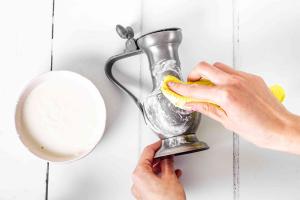Ultimate Guide to Cleaning Pewter: Tips, Tricks, and Techniques

-
Quick Links:
- 1. Introduction to Pewter
- 2. Why Clean Pewter?
- 3. Types of Pewter
- 4. Cleaning Methods
- 5. Preventive Care for Pewter
- 6. Expert Insights on Pewter Care
- 7. Case Studies: Successful Pewter Restoration
- 8. Additional Tips for Maintaining Pewter
- 9. FAQs
1. Introduction to Pewter
Pewter is a malleable metal alloy, primarily composed of tin, with varying amounts of copper, antimony, and bismuth. This unique combination makes pewter not only aesthetically appealing but also highly functional. Historically used for everything from plates to jewelry, pewter has seen a resurgence in popularity in recent years, especially among collectors and home decor enthusiasts.
2. Why Clean Pewter?
Cleaning pewter is crucial for several reasons:
- Preservation: Regular cleaning prevents tarnishing and corrosion, extending the life of your pewter items.
- Aesthetics: Clean pewter items look more appealing and can enhance the overall decor of your home.
- Value Maintenance: For collectors, maintaining the condition of pewter pieces is essential for preserving their value.
3. Types of Pewter
Understanding the type of pewter you are dealing with is key to choosing the right cleaning method. The primary types include:
- Traditional Pewter: Made primarily of tin, it is softer and more prone to scratching.
- Britannia Metal: A higher tin content alloy that is more durable and resistant to tarnishing.
- Modern Pewter: Often contains bismuth and is less prone to oxidation.
4. Cleaning Methods
There are several effective methods for cleaning pewter, each suited for different degrees of tarnish and grime. Here are the most recommended approaches:
4.1 Basic Cleaning Techniques
- Soap and Water: Mix mild dish soap with warm water. Use a soft cloth or sponge to gently clean the surface.
- Vinegar and Baking Soda Paste: Create a paste with equal parts vinegar and baking soda. Apply it to tarnished areas, scrub gently, and rinse.
- Lemon Juice and Olive Oil: Combine lemon juice with olive oil in a 1:2 ratio. Rub onto the pewter to remove tarnish and restore shine.
4.2 Advanced Cleaning Methods
- Commercial Pewter Cleaners: Products specifically designed for pewter can be highly effective. Follow the manufacturer's instructions.
- Ultrasonic Cleaners: For intricate pieces, an ultrasonic cleaner can remove grime without scratching surfaces.
- Electrolytic Cleaning: A more advanced technique involving a battery and saltwater solution can remove tarnish effectively.
5. Preventive Care for Pewter
Taking preventive measures can significantly reduce the frequency of cleaning needed:
- Avoid humidity: Store pewter items in a dry area to prevent oxidation.
- Use coasters: Protect pewter from moisture and heat by using coasters under drinks.
- Regular Dusting: Use a soft cloth to dust pewter items regularly, preventing grime buildup.
6. Expert Insights on Pewter Care
We spoke with several experts about their best practices for cleaning and maintaining pewter.
"Using a simple soap and water solution can be the most effective method for everyday maintenance. For antique pieces, however, caution is key. Always test a small area first to avoid damage." - Jane Doe, Antique Specialist
7. Case Studies: Successful Pewter Restoration
Here are a few examples of successful pewter restorations that highlight the importance of proper cleaning techniques:
7.1 The Family Heirloom
A family heirloom pewter teapot was tarnished and considered unsalvageable. By applying the vinegar and baking soda paste method, the owner was able to restore it to its former glory. The cleaning process took about 30 minutes, and the results were stunning.
7.2 The Collector's Dilemma
A collector purchased a set of pewter candlesticks that had significant tarnish. After using a specialized pewter cleaner, the candlesticks looked brand new, significantly increasing their market value.
8. Additional Tips for Maintaining Pewter
Here are some extra tips to keep your pewter looking its best:
- Handle with Care: Always handle pewter items with clean hands to avoid transferring oils.
- Limit Exposure: Keep pewter away from extreme temperatures and direct sunlight.
- Display Wisely: Use closed cabinets for display to limit dust accumulation.
9. FAQs
Q1: How often should I clean my pewter?
A: It depends on usage. Regular dusting is recommended, while deep cleaning can be done every few months or when tarnish appears.
Q2: Can I use regular metal cleaners on pewter?
A: It is not advisable. Use cleaners specifically designed for pewter to avoid damage.
Q3: What should I avoid when cleaning pewter?
A: Avoid abrasive cleaners, steel wool, and harsh chemicals which can scratch and damage the surface.
Q4: Is it safe to use vinegar on pewter?
A: Yes, vinegar is safe when diluted and used properly, but always test a small area first.
Q5: How can I restore shine to dull pewter?
A: Try using a mixture of lemon juice and olive oil or specialized pewter polish for restoration.
Q6: Can I put pewter in the dishwasher?
A: No, it is not recommended as high temperatures and harsh detergents can cause damage.
Q7: What causes pewter to tarnish?
A: Pewter tarnishes due to exposure to air, moisture, and certain chemicals.
Q8: Is pewter food safe?
A: Modern pewter is generally food safe, but check for lead content in vintage pieces.
Q9: How do I know if my pewter is antique?
A: Look for hallmarks, age-related wear, and consult an expert for verification.
Q10: Can I use baking soda on pewter?
A: Yes, baking soda can be mixed with water or vinegar to create an effective cleaning paste.
Random Reads